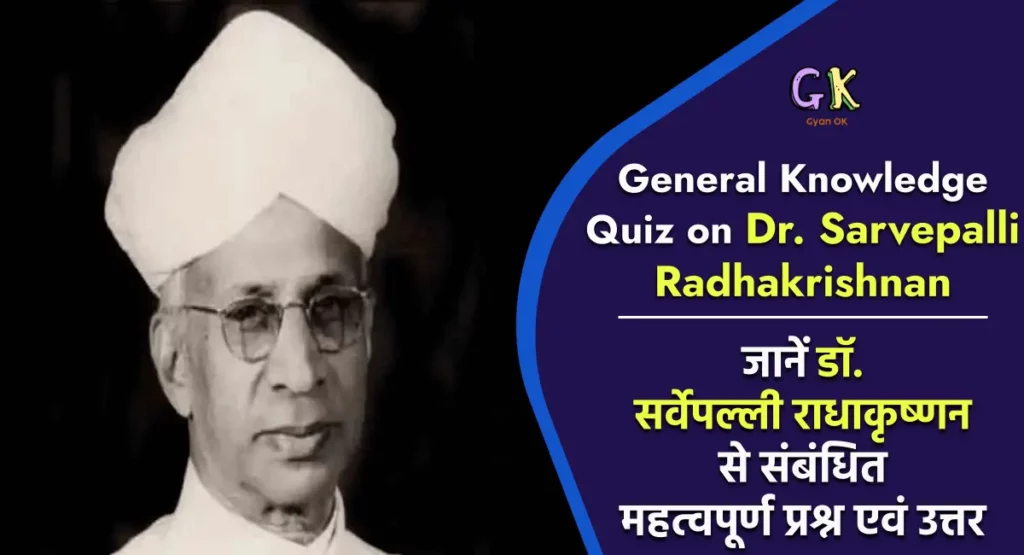Dr. Sarvepalli Radhakrishnan, a distinguished scholar, philosopher, and India’s second President, left an indelible mark on the nation’s intellectual and political landscape. His deep understanding of philosophy and spirituality made him a revered figure. To honour his legacy and promote a deeper understanding of his contributions, we’ve crafted a quiz that explores the life and philosophies of Dr. Sarvepalli Radhakrishnan. To check out the quiz read the rest of the article.

General Knowledge Quiz on Dr. Sarvepalli Radhakrishnan
Dr. Sarvepalli Radhakrishnan was known for his sharp intellect and profound wisdom. His major significance in Indian history lies in his role as a distinguished philosopher, the first Vice President, and the second President of India. His philosophical insights and contributions to education enriched India’s cultural and intellectual heritage, making him an iconic figure in the nation’s history.
Following we have prepared a quiz on Dr. Sarvepalli Radhakrishnan for your self-assessment on the topic and to help you learn something through the process.
[–MCQ-QUESTIONS-DISPLAY–]
About Dr. Sarvepalli Radhakrishnan
Dr. Sarvepalli Radhakrishnan, a luminary in the fields of philosophy, education, and politics, was one of India’s most respected and influential thinkers of the 20th century. Born on September 5, 1888, in Tiruttani, a small town in Tamil Nadu, he would go on to become India’s first Vice President and second President, leaving an indelible mark on the nation’s intellectual and political landscape.
Radhakrishnan’s early education took place in Tirupati and Vellore, where he demonstrated exceptional academic prowess. His thirst for knowledge led him to pursue higher studies at Madras Christian College and later at the University of Madras. He excelled in philosophy and emerged as a distinguished scholar.
In 1909, Radhakrishnan was appointed as a lecturer in the Department of Philosophy at Madras Presidency College. His deep understanding of Indian philosophy and Western thought earned him a reputation as a brilliant philosopher. His seminal work, “The Philosophy of Rabindranath Tagore,” published in 1917, showcased his intellectual acumen and profound insights.
Radhakrishnan’s growing influence in the academic world led to a series of prominent positions in prestigious institutions. He served as a Professor of Philosophy at the University of Mysore and later as the Spalding Professor of Eastern Religions and Ethics at the University of Oxford. His lectures and writings on Eastern and Western philosophies gained international recognition, establishing him as a leading authority in the field.
In 1931, Radhakrishnan returned to India as the Vice-Chancellor of Andhra University. His tenure marked a significant period of educational reform and innovation. He believed in the harmonious blend of traditional Indian wisdom and modern education, a philosophy that guided his educational reforms.
One of his most influential works, “The Idealist View of Life,” published in 1932, captured his philosophical perspective on life and ethics. His ideas emphasized the importance of morality, spirituality, and human values in education and society.
During India’s struggle for independence, Radhakrishnan became an active participant in the political arena. He served as the Vice-Chancellor of Banaras Hindu University and was later elected as a member of the Constituent Assembly, which was tasked with drafting India’s Constitution. His deep insights into ethics and constitutional matters were invaluable during this critical phase of nation-building.
After India gained independence in 1947, Radhakrishnan’s contributions continued to be recognized. He was appointed as India’s first Vice President in 1952 and subsequently as the second President of India in 1962. His tenure as President was marked by his efforts to promote education, culture, and international relations.
Radhakrishnan’s birthday, September 5th, is celebrated as Teacher’s Day in India in honor of his dedication to education and his belief in the pivotal role of teachers in shaping young minds. He was a firm advocate for the role of education in nurturing responsible and ethical citizens.
Dr. Sarvepalli Radhakrishnan’s influence extended far beyond India’s borders. He was a prominent figure on the global stage, representing India at international forums and promoting dialogue among civilizations. His commitment to peace and understanding earned him the Bharat Ratna, India’s highest civilian award, in 1954.
